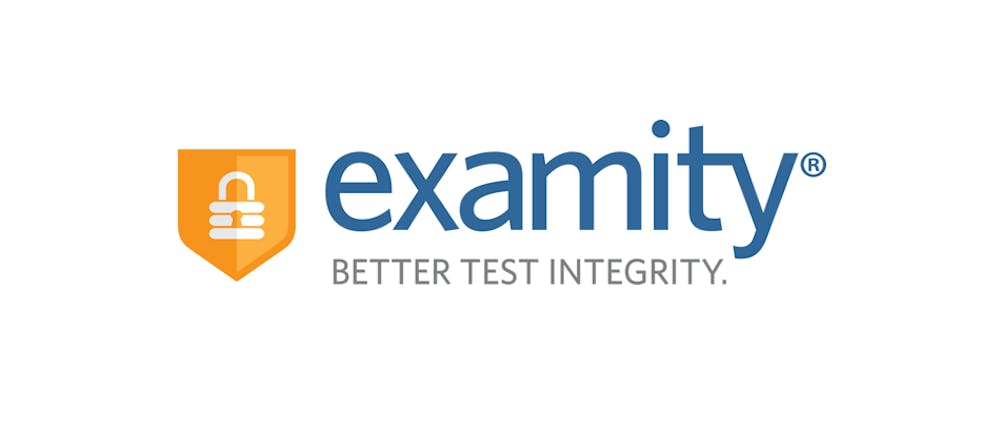[caption id="attachment_16415" align="aligncenter" width="950"] Students are concerned about Examity, a computer software that uses a computer’s webcam and microphone to monitor exam cheating. Graphic via odltools.arizona.edu[/caption]
Examity, an online proctoring software that was founded in 2013 to meet the needs of the growing number of online education and certification programs looking to ensure academic integrity, is present in over 150 schools.
Seton Hall has become one of those schools this year, according to a Business Wire press release sent out on Oct. 26, 2016.
Dr. Danielle Mirliss, the associate director of SHU’s TLTC (Teaching, Learning and Technology) Center, said via email, “The use of an online proctoring was a new experience for the students involved in the pilot of Examity.”
Eight online courses have piloted this tool over the summer and fall 2016 semesters, according to Mirliss.
The proctoring process uses a student’s own webcam and microphone to ensure that the student is not violating exam protocol. If issues do arise the program makes “comments” and issues flags to inform instructors to pay extra attention to a student’s exam during the grading process.
Some students have reported feeling uncomfortable with being monitored by a web camera. However, Mirliss believes that the benefits outweigh the perceived risks.
“Verification of one’s identity in an online course is quickly becoming a mandate for the accreditation of many programs,” Mirliss said.
One student, Sahil Sharma, a junior accounting major, is in one of the online classes that is pioneering the effort on campus, Enterprise Wide Accounting Information Systems Management. He and a few classmates had a meeting with the Dean of the Stillman School, Dr. Joyce Strawser, to discuss their apprehension at using Examity.
“At first,” Sharma said, “I was concerned that the whole program was an invasion of privacy because of the nature of dealing with webcams and that kind of technology.” However, Sharma said that once the exam was over he felt this invasion to be nothing more than a minor issue. He even preferred it to some of the other online exams he had taken.
Associate Professor in the department of Computing and Decision Sciences, Viswa Viswanathan, said this is an efficient way to administer an exam to his 150 plus student body. He adds, “90-95 percent of students do the exam without any untoward incidents. But some will and that is not fair to those who do the work.”
When asked if he thought that implementing this proctoring service had a significant effect on the amount of cheating, Viswanathan said he has a feeling it does.
Viswanathan said he received complaints from concerned students prior to the exam. “I think it is reasonable to be upset over this,” he said, “but the technology and the company has been vetted for [security concerns].”
According to Examity’s website, yellow flags are issued when the proctor observes minor violations and red flags when students show “clear cheating behavior.” The program does alert students when it is about to “take over” their computers.
Blackboard Inc. has recently announced its partnership with the Massachusetts based start-up Examity.
Examity reviewed 62,534 final exams of U.S. college students back in March and found that only 6 percent of the group broke the test rules, according to an Oct. 26, 2016, press release sent out by Business Wire. This is a much lower figure than the one The Boston Globe reported in 2012, which indicated that a staggering 75 percent of students admit to some academic impropriety.
Brynne Connolly can be reached at brynne.connolly@student.shu.edu.
Students are concerned about Examity, a computer software that uses a computer’s webcam and microphone to monitor exam cheating. Graphic via odltools.arizona.edu[/caption]
Examity, an online proctoring software that was founded in 2013 to meet the needs of the growing number of online education and certification programs looking to ensure academic integrity, is present in over 150 schools.
Seton Hall has become one of those schools this year, according to a Business Wire press release sent out on Oct. 26, 2016.
Dr. Danielle Mirliss, the associate director of SHU’s TLTC (Teaching, Learning and Technology) Center, said via email, “The use of an online proctoring was a new experience for the students involved in the pilot of Examity.”
Eight online courses have piloted this tool over the summer and fall 2016 semesters, according to Mirliss.
The proctoring process uses a student’s own webcam and microphone to ensure that the student is not violating exam protocol. If issues do arise the program makes “comments” and issues flags to inform instructors to pay extra attention to a student’s exam during the grading process.
Some students have reported feeling uncomfortable with being monitored by a web camera. However, Mirliss believes that the benefits outweigh the perceived risks.
“Verification of one’s identity in an online course is quickly becoming a mandate for the accreditation of many programs,” Mirliss said.
One student, Sahil Sharma, a junior accounting major, is in one of the online classes that is pioneering the effort on campus, Enterprise Wide Accounting Information Systems Management. He and a few classmates had a meeting with the Dean of the Stillman School, Dr. Joyce Strawser, to discuss their apprehension at using Examity.
“At first,” Sharma said, “I was concerned that the whole program was an invasion of privacy because of the nature of dealing with webcams and that kind of technology.” However, Sharma said that once the exam was over he felt this invasion to be nothing more than a minor issue. He even preferred it to some of the other online exams he had taken.
Associate Professor in the department of Computing and Decision Sciences, Viswa Viswanathan, said this is an efficient way to administer an exam to his 150 plus student body. He adds, “90-95 percent of students do the exam without any untoward incidents. But some will and that is not fair to those who do the work.”
When asked if he thought that implementing this proctoring service had a significant effect on the amount of cheating, Viswanathan said he has a feeling it does.
Viswanathan said he received complaints from concerned students prior to the exam. “I think it is reasonable to be upset over this,” he said, “but the technology and the company has been vetted for [security concerns].”
According to Examity’s website, yellow flags are issued when the proctor observes minor violations and red flags when students show “clear cheating behavior.” The program does alert students when it is about to “take over” their computers.
Blackboard Inc. has recently announced its partnership with the Massachusetts based start-up Examity.
Examity reviewed 62,534 final exams of U.S. college students back in March and found that only 6 percent of the group broke the test rules, according to an Oct. 26, 2016, press release sent out by Business Wire. This is a much lower figure than the one The Boston Globe reported in 2012, which indicated that a staggering 75 percent of students admit to some academic impropriety.
Brynne Connolly can be reached at brynne.connolly@student.shu.edu.

Comments




